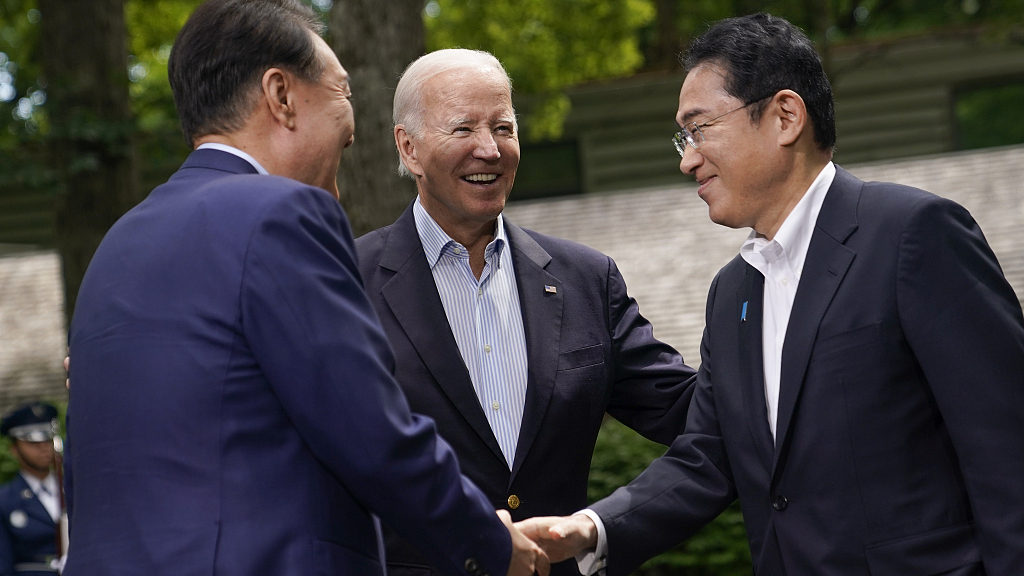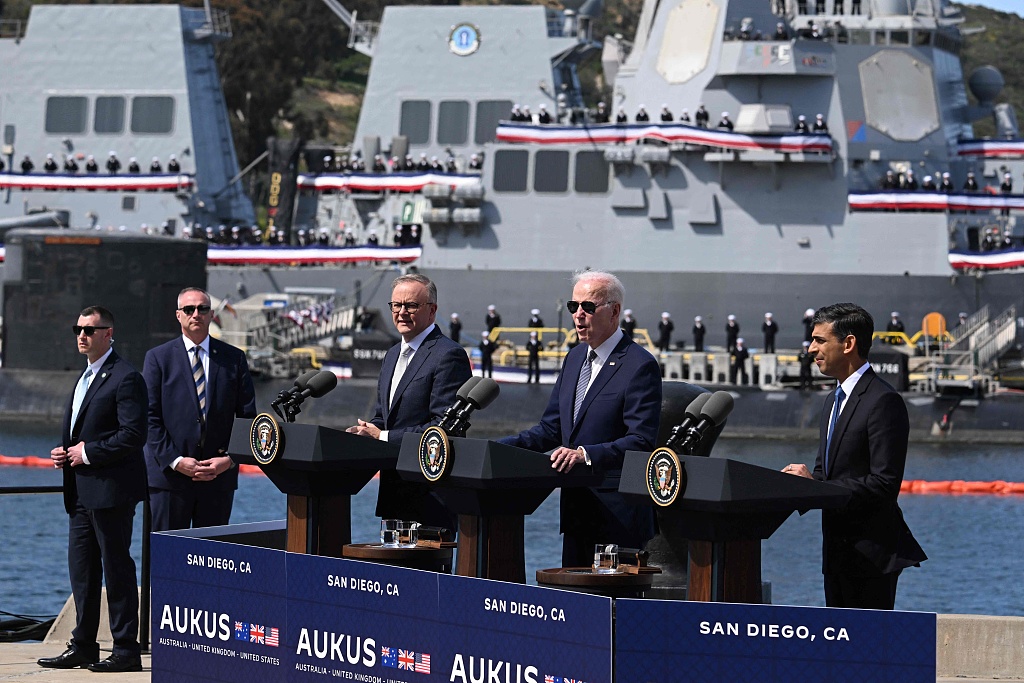
U.S. President Joe Biden smiles as South Korean President Yoon Suk-yeol and Japanese Prime Minister Fumio Kishida shake hands at the Trilateral Summit at Camp David, a military base in Maryland, United States, August 18, 2023. /CFP
U.S. President Joe Biden smiles as South Korean President Yoon Suk-yeol and Japanese Prime Minister Fumio Kishida shake hands at the Trilateral Summit at Camp David, a military base in Maryland, United States, August 18, 2023. /CFP
Editor's note: Mariam Shah, a special commentator for CGTN, is an Islamabad-based independent researcher in the field of conflict studies and military psychology. The article reflects the author's opinions and not necessarily the views of CGTN.
The recent Trilateral Leaders' Summit at Camp David between U.S. President Joe Biden, Japan's Prime Minister Fumio Kishida, and South Korea's President Yoon Suk-yeol indicates a provocative move, particularly in the Pacific region. This event has again stirred waves of apprehension, as the three states have aligned to "counter" China. This new alliance will shape the shifting world order, potentially igniting a tense faceoff.
Moreover, this summit clearly illustrates how the geopolitical landscape is evolving. Some countries have shunned historical differences and animosities, adopted new strategies, and formed alliances reminiscent of the Cold War era.
For some time, there was a notion that an emerging security alliance similar to NATO would emerge in Asia-Pacific. Soon after the NATO member's swift response to arm Ukraine in countering Russia last year, there was widespread speculation that a similar U.S.-led security alliance might emerge in Asia-Pacific.
Biden did not take too long to reinforce this perception and a warning. This move by the U.S., Japan, and South Korea has amplified the concerns. If this trilateral alliance is going to be a "mini NATO," it could significantly alter the regional balance of power, affecting and restructuring the stability of Asia-Pacific.
As per many observations, the summit's core objective is to create "deterrence" against China and the Democratic People's Republic of Korea. The point of contention is that the meeting and events at Camp David will reverberate far beyond the summit venue, as they will amplify complexities revolving around global relationships and alliances while leaving little room for dialogue and deliberations.
Although the U.S. administration has heightened its diplomatic, economic, and military pressures on China, Western officials avoid using the term "cold war," and rather they sugarcoat it as "enhanced security and defense cooperation" and the importance of a "free and open Indo-Pacific region."
But these cannot hide the reality that Biden's actions aim to counter China. Many such pacts are undeniably directed toward China from expanded military exercises and enhanced ballistic missile cooperation.
This is not the first time the U.S. has used these provocative actions through alliances and security pacts. Quad and AUKUS are also examples of countering strategies aimed toward China. These moves, including the exclusionary groupings and bloc confrontation, will destabilize Asia-Pacific and beyond. The region was already highly volatile, and now, with this development, the equilibrium seems unsteady and on the verge of a significant transformation.

U.S. President Joe Biden speaks alongside British Prime Minister Rishi Sunak and Australian Prime Minister Anthony Albanese at a press conference during the AUKUS summit at Naval Base Point Loma in San Diego, California, United States, March 13, 2023. /CFP
U.S. President Joe Biden speaks alongside British Prime Minister Rishi Sunak and Australian Prime Minister Anthony Albanese at a press conference during the AUKUS summit at Naval Base Point Loma in San Diego, California, United States, March 13, 2023. /CFP
Moreover, Japan has seemingly shed its postwar-pacifist approach, and this journey toward Camp David seals it as a U.S. military ally in Asia-Pacific.
The impression of the entire summit and its agenda signals a new cold war. The world is still suffering from the effects of the last Cold War, and it can no longer go through another episode of intense rivalry, proxy warfare, series of espionage, and a race for technological, military, and political supremacy. The Cold War destroyed the very fabric of the global ethics and moral base, forcing several states to choose sides. If we enter a new cold war, it will affect the international security paradigm, creating tense impasses and an unending cycle of arms races and conflicts.
The U.S. has a history of trampling on other nations to achieve its goals. And there is a fine line between securing national interests and exhibiting hegemonic ambitions. In a news briefing, Chinese Foreign Ministry Spokesperson Wang Wenbin said, "No country should seek its own security at the expense of other countries' security interests and regional peace and stability." The message here is simple. No state should compromise the security of others to pursue its own.
The present-day world demands a less unilateral and more collaborative approach to dealing with threats. There is a need for diplomacy and strategic cooperation to ensure that security is achieved without aggravating tensions and disrupting stability.
As the global landscape changes, it is crucial to ensure that history doesn't repeat itself. It is time for an open dialogue and careful consideration of the potential consequences of this provocation by the U.S. Whatever happens today, whatever choices are made and strategies employed, it will affect future generations. All these steps will shape the path of peace, cooperation, and conflict on the global stage. Conflicts or dialogue? The world needs to choose wisely.
(If you want to contribute and have specific expertise, please contact us at opinions@cgtn.com. Follow @thouse_opinions on Twitter to discover the latest commentaries in the CGTN Opinion Section.)